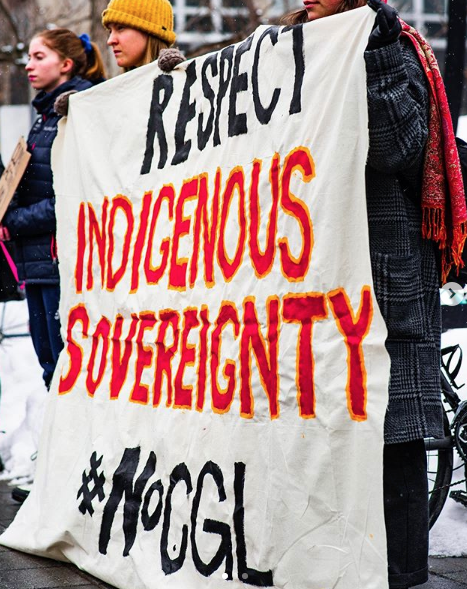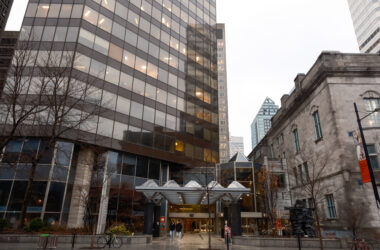A small crowd of demonstrators braved the cold on Feb. 13 and gathered outside the James Administration building for a Divest McGill rally. The group called on the university to withdraw their investments in Coastal Gaslink and Teck Mining. In the midst of the ongoing conflict between Wet’suwet’en land defenders and the Royal Canadian Mounted Police (RCMP) over the construction of the Coastal Gaslink pipeline in British Columbia (BC), the rally was intended to draw attention to the social consequences of the fossil fuel industry.
Following a land acknowledgment and a performance by the activist group The Montreal Raging Grannies, the rally hosted several speakers from different groups within the McGill community. First to address the crowd was Morgen Bertheussen, a member of Divest McGill, who emphasized the important role that Indigenous communities have played in climate activism.
“As students and activists at this university fighting for climate justice, we stand on the shoulders of many Indigenous land defenders before us,” Bertheussen said. “Here, the Kanien’kehá:ka and Mohawk have laid the foundation for resistance to oppressive and destructive colonial powers for the past four centuries.”
The tone of the rally, which was held on International Fossil Fuel Divestment Day, was set by recent friction between the BC government and the Wet’suwet’en Nation, located on unceded territory in Northern BC. RCMP arrests of Wet’suwet’en members protesting the construction of TC Energy’s Coastal Gaslink pipeline, a company in which McGill has substantial investments, has sparked outrage across Canada, prompting other protestors to blockade nationally-owned railways in Quebec and Ontario.
“The Canadian government is siding with TC Energy and is calling the RCMP to violently raid and remove people from their land,” said Bertheussen. “McGill’s endowment [in TC energy] is directly complicit with this violence.”
In December 2019, the McGill Board of Governors (BoG) announced its decision to not divest McGill’s $148 million dollar endowments in the fossil fuel industry based on a report by the Committee to Advise on Matters of Social Responsibility (CAMSR). The committee’s report found that the activities of fossil fuel companies failed to meet the criterion of creating ‘social injury’ and thus did not recommend divestment to the Board of Governors.
For Heleena De Oliveira, U2 Arts and member of the McGill Black Students Network (BSN), climate and social justice issues are inextricably linked.
“Most people at this protest, myself included, […] will not be the ones feeling the most severe impacts of the global climate crisis,” De Oliveira said. “The worst effects of climate change will be felt by people whose race, gender, and class puts them at a politically condemned position […] as I see it the intersectionality between race, gender, sexuality, class, and the environment is quite clear.”
On-campus support for the divestment movement has generated increasingly public actions in the previous year. In April 2019, Derek Nystrom and Darin Barney, two academic staff representatives on the BoG, resigned from their positions due to the university’s continued investment in fossil fuels. Similarly in January, following the CAMSR report, tenured professor Gregory Mikkelson announced his resignation.
Ehab Lotayef, a current member of the BoG and a supporter of divestment, praised the actions of those staff members who had come out in opposition to divestment and called on the university to reconsider the issue.
“It is very disappointing to see McGill falling back behind other Canadian and Quebec universities,” Lotayef said. “I believe it is the time for McGill to take [the] position [of divestment]. It is never too late, now is the time to do it.”
Principal and Vice-Chancellor Suzanne Fortier’s office was contacted regarding the rally. She did not respond to a request for comment as of press time.









